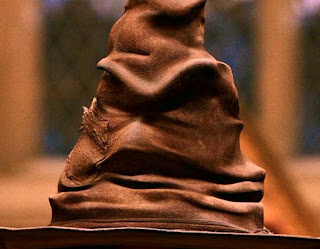"Uprooted" is a fantasy drawing on Slavic fairy-tales, but it's not a retelling of any particular story. It's told from the perspective of Agnieszka, a young woman who is selected from her village to be a sorcerer's apprentice, and who turns out to have great magical aptitude herself. The plot hinges on the battle between humans and The Wood, a supernaturally-charged and malevolent forest.
We were almost astonished at how near-universally high we rated this book, finding it very enjoyable and superbly written. Although we did have a few quibbles with some of the pacing/tone later on, and a few folks couldn't quite get into it, we mostly had nothing but praise for the writing--particularly the way it sidesteps a number of pitfalls that often spoil this kind of story.
Possible spoilers below:
 |
| Much of my career confusion to date probably stems from the childhood indoctrination that "you will get free food if you just read a bunch". |
But! "Uprooted". Oddly enough, we started with thanks for what the books was not, given the seeming possibility at some point while reading it:
- Not Bluebeard (Agnieszka doesn't discover something horrible/creepy behind a forbidden door etc.)
- Not a Blame-Game (common fairy-tale trope about broken obedience)
- Not a Training Montage (which it threatened for a hot minute before breaking away from that trope.) Also, it should be noted that Agnieszka didn't trigger the Chicago Nerds' Pluck Limit Detector, a remarkable achievement.
- Not a Retelling of a known story (à la Maguire's "Wicked" etc.)
- Not "50 Shades" or "Twilight"--there was a moment there were I got worried it was going to fall into the "characterize domineering jerkiness as romance" trope-hole, but it got past it.
- Not the First of a Series. Thank goodness.
I really liked the echoes of Tolkien here, which were pretty clear at a few points (at least for a Tolkien nut), though the resonances aren't with the main plot of "The Lord of the Rings", but rather some of the odd loose ends. The entire Wood recalls the malevolent Old Forest outside of Bree, including near-reenactments of Old Man Willow's unsuccessful absorbing of the hobbits; bits of the Wood & Queen's motivation closely line up with Yavanna's original plea to create the Ents as described in "Silmarillion"--to give agency, even violent agency, to the otherwise defenseless wilderness. Less clear, but still there, I thought that Tolkien's themes of corruption (the barrow-wights, the orcs twisted by hate, the Ring-wraiths) were somewhat felt in Novik's repeated theme of corruption/contamination by the wood, and the "Perilous Queen of the Wood" imagery somewhat mirrors Galadriel. Granted, this may be just a case of Tolkien & Novik drawing on similar sources, but given the closeness of the text at points and Novik's acknowledgment of Tolkien as a major influence, I think there's something here.
As an aside, I found it intriguing to see nature as the villain, especially as it was often accompanied by merely living sensory cues (the smell of birch-sap, for instance) and while "corruption" was a touch-word, Novik did not rely very much at all on trite evil-signifiers like rot. The "humans good, nature bad" dichotomy is, however, undercut and complicated by Agnieszka's connection to the land, and her more organic, less structured use of magic.
Magic! We found the wizards an intriguing bunch of characters, and really dug the magic system and mechanics here, the way there are different styles of using it, with Agnieszka more like improvisational jazz to the other wizards' rigid chamber music.
Speaking of rigid chamber music, we did critique the Dragon & Agnieszka's sex scene a bit, pointing out that it's upholding the "incredibly easy orgasm" probable-mischaracterization common to stock fantasy stories. But, we did point out that they have a connection through the intimacy of their shared magic, which maybe hand-waves some of our concerns away.
Again, we liked the magical descriptions here, with Agnieszka getting a sense of the structure or shape of other magic-users, and the sort of mysterious "inner landscape" of those touched by the wood. Oh! And I liked the subtle semi-telepathy throughout the book, with magic-users responding aloud to Agnieszka's unspoken thoughts, and then at the very end of the book she does the same thing to the Dragon.
Much like the list of things the novel is not, we appreciated the "Tropes that Don't" here, where very common patterns were unexpectedly subverted, or just fizzled. For instance:
 |
| "Have you considered avoiding this divisive caste system entirely, Harry? |
- The Super-Awesome Death Sword that...Doesn't Work
- The
Sorting HatMagic Bell moment that refuses to give Agnieszka a cool witch-name. - The fact that some of the potions, while pretty miraculous, are also so expensive that using them may have altered the balance in a war: rare to see consequences on these kinds of thing.
- The whole palace-intrigue plot, where it looks like we know Agnieszka's quest, and then she's completely out of her league and the story goes an entirely different direction.
Overall, a surprisingly fun read. "Uprooted" has been getting a lot of Hugo/Nebula buzz, and I'm glad I read it. It's also interesting to consider it kind of neck-and-neck with Stephenson's "Seveneves": fairly "classic" fantasy and science fiction topping the lists this year.
The Chicago Nerds' selection for February is "Time Salvager" by Chicago author Wesley Chu. Keep your eye out for this and other CNSC events at their website & Facebook.


No comments:
Post a Comment